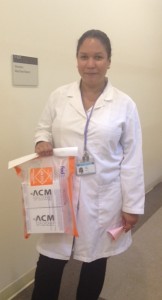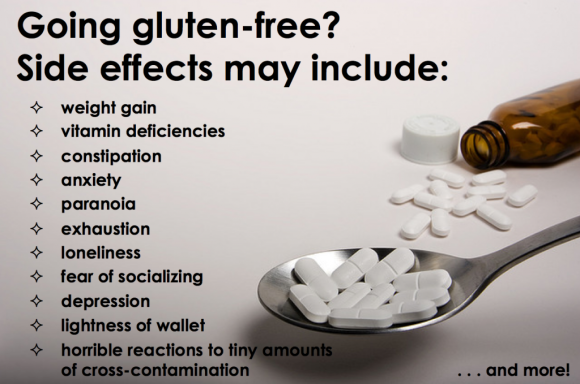Sorry, guys. I didn’t mean to hold out on you, but you know how summer gets. You’re busy with your NEW projects, like relearning to play the guitar or jab-cross-hooking at the local kickboxing studio, all while trying to soak up as much sunlight as you can on those glorious long weekend days. The computer is the last place you want to be (especially if—cue the whining—you’re still trying to avoid screens in an effort to kill your sleep problems).
As I’ve mentioned, before officially enrolling in the Celiaction study I had to undergo an endoscopy (with multiple biopsies) to prove I still have intestinal damage and can therefore reasonably blame my ongoing symptoms on celiac disease, rather than a mystery ailment, hypochondria, or “somatization disorder.”
The endoscopy went down last week and was about as much fun as it always is to eat and drink nothing for twelve-plus hours, don an IV bag and a precariously fastened tent of a hospital gown, and get a camera stuck down your throat and into your intestines. (Getting paid for it, I admit, was pretty fun.)

My hospital ID and “allergy” bracelets. I also had a big “NO GLUTEN” sign on my bed in case someone gave me crackers while I was too drugged to resist.
For extra enjoyment, I woke up in the middle of the procedure. I was certain I was going to throw up and suffocate myself, but I stayed still, expressing my panic only through my now-wide-open eyes. I distinctly remember my doctor saying, after she noticed I was awake and before they put me under again, that I was being “such a good patient.” (That may be an anesthesia-induced hallucination, but I’m proud of it nonetheless.)

Shipping my intestines off for inspection
The study coordinator kindly consented to be photographed with the package of samples taken from the intestinal lining of yours truly, en route to the lab. I went home to sleep it off, and then—like all of you have been doing, I’m sure—I waited.
Are my guts damaged enough?, I wondered. Oh, please, let my guts be damaged enough.
Well, the verdict is in . . . and so am I! I’m not sure yet of the exact Marsh score, but the biopsies showed mild damage—an improvement over the “diffuse subtotal to total villous atrophy” I used to have, but not a full recovery. So, yay! I’m in the study! I’ll keep making my phone calls and soon I’ll start taking either ALV003 or a placebo.
No one will know which I receive—not me, not the researchers. Many other things are equally uncertain. Will I feel better? If I do, will it be due to the drug? The placebo effect? The kickboxing? Or just time, steadily continuing to do its work?
Because it’ll be so uncertain why I’m feeling however I’m feeling in a few weeks or months, the study coordinators have asked me to refrain from publicly sharing my health progress during the trial. Out of context, my symptoms or lack thereof won’t reveal anything about the medicine’s effect, but my reports still might unduly influence someone else in the study who happened across this blog. In the name of Science, I’m happy to oblige the request (and was flattered to receive it!).
So, this is the last you’ll hear from me for now on how I’m doing (middlingly). I’ll still likely write about the study, just not my symptoms. If you find yourself dying to know how I am, and you aren’t in the study yourself, I welcome any and all questions, however personal, by email. Otherwise—assuming my summertime laziness subsides—I’m sure we’ll find plenty of other stuff to talk about!
What are your summer projects? How was your endoscopy experience?


